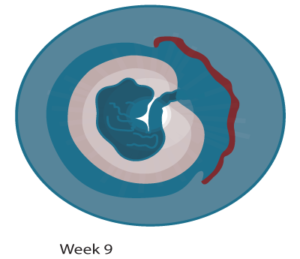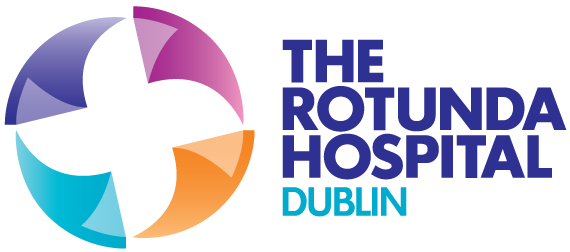The First Trimester
Weeks 0 – 12
During the first trimester your baby will grow from a cluster of cells into a recognisable fetus (baby) that is 5 cm (2 inches) long. It is the time when the foundations of your pregnancy are being laid down. The tiny cells produce biochemical messengers that will send signals to your body to stop your periods. The different layers of the cells will develop to create specific parts of the baby’s body.
 By week five the building blocks for your baby’s organs are already in place. The heart begins to form and circulate blood. The position of the spine and digestive system are in place. Your baby is only 2 mm long at the end of week 5.
By week five the building blocks for your baby’s organs are already in place. The heart begins to form and circulate blood. The position of the spine and digestive system are in place. Your baby is only 2 mm long at the end of week 5.
Your changing body:
In the first few weeks of pregnancy you will not look or feel pregnant, yet your body is already having major changes because you start to produce a lot of pregnancy hormones immediately after conception. The hormone oestrogen thickens the lining of your womb (uterus) and other hormones help the baby to settle down in your womb. Some women are very sensitive to the changes in their body and they know they are pregnant even before they miss a period. Women often feel that their breasts are more tender; you may notice that you want to pass urine more often, and for some women they can feel tired and sick.
Things to do:
- If you are not already taking folic acid you should start now. You can get it in any pharmacy. Taking folic acid is very important as it reduces the risk of the baby developing a neural tube condition such as spina bifida. This happens when the tissues that fold to form the neural tube when the baby is growing in the womb do not close completely; the defect can happen anywhere from the base of the skull to the lower part of the back called the sacrum.
- Make an effort to change your lifestyle by stopping smoking and drinking alcohol and/or taking recreational drugs.
- Be good to yourself by eating little and often. Food hygiene is essential to protect you and your baby against the risk of food poisoning.
- Book an antenatal visit with your doctor (GP) and your maternity hospital.
Weeks 6 – 10
During these four weeks, your developing baby will start to change a lot in appearance, so by week 10 your little baby is starting to look like a human being. At week 6 your baby is sprouting limb buds from which the arms and legs will develop. The head continues to grow quicker than any other part of the body in order to accommodate the developing brain. By the end of week 6 your baby is 5 mm (0.2 inch) long.
Week 7:
Your baby is 12 mm (0.5 inch) long and the heartbeat can be seen on ultrasound scan. Your baby’s eyes and ears are developing quickly; by the end of week 8, the eyes already contain some colour. Your baby is now 15 mm (0.6 inch) long.
 Week 9
Week 9
The folds of skin making up the limb buds start to form cartilage, which will later grow into bones. You can see your baby’s movements on ultrasound but you will not feel any of this for some time. The baby is 22 mm (0.9 inch) long by the end of the week 10. You can recognise its eyes but they will stay hidden behind sealed lids and cannot work until later in the second trimester, when the nervous system forms. The heart has developed with four definitive chambers; the heart is beating 160 times per minute. Your baby is now 33 mm (1.3 inches) long.
Week 11:
Your baby’s face is fully formed; the liver, stomach and spleen are all in place. You can see the baby’s ears, and the inner ear, which is responsible for balance and hearing, is formed. Your baby has 32 permanent teeth buds. The baby is now 40 mm (1.6 inches) long.
Week 12:
Your baby now looks like a human being; its spine, fingers and toes are fully formed. Your baby is now 5 cm (2 inches) long and weighs 18 grams (0.6 ounce). It is during this initial period of development that things like drugs, viruses and environmental factors (anything that comes into direct contact with the mother or baby) can easily damage a baby; so pregnant women should avoid all of these.
Your changing body:
During the early stages of your pregnancy your uterus (womb) will grow a lot in size. By eight weeks it is the size of a medium sized orange, while at 10 weeks it is the size of a grapefruit. To make your womb grow, blood flow from your heart increases. Because of these changes in your circulatory system, you will become aware of differences in the way your body is working; for example changes in your breasts, wanting to pass urine more often and your skin will either become clearer or drier than usual.
Physically some women go through the first trimester feeling well, however, it is common to feel very tired, and nausea can be a major problem. Morning sickness is the most talked about side effect of pregnancy, as 70 – 80% of women will experience it. Morning sickness can happen at any time of the day. Occasionally, some women cannot keep any food or drinks in their stomach and they become dehydrated and weak, and need to go to hospital for treatment.
Emotionally, you may find your moods change a lot. One minute you could be talking excitedly about the pregnancy and the next you are crying over something very unimportant. This is because of the major hormonal changes that happen in early pregnancy and will settle later in your pregnancy.
